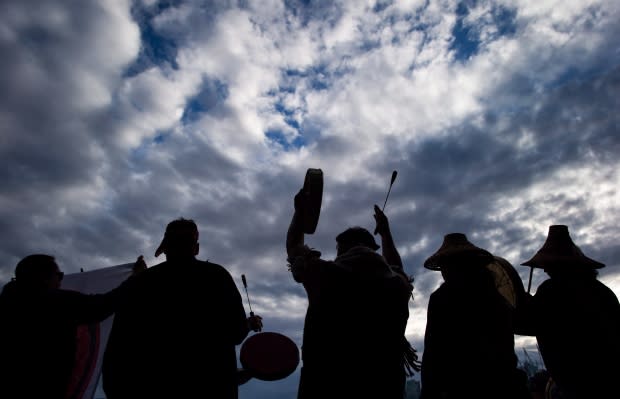Why Trudeau's Trans Mountain do-over might need Indigenous investment
That the federal cabinet would (again) approve the proposed expansion of the Trans-Mountain pipeline was never really in any doubt.
After spending $4.5 billion to buy the line last year, and with Prime Minister Justin Trudeau's repeated assurances that the project would go ahead, the real question was how far the government would go to accommodate the concerns of those Indigenous communities who oppose it.
The answer, according to the prime minister, is — far enough to satisfy last year's federal Court of Appeals ruling that found the first round of talks with those groups left much to be desired.
"Missing was a genuine and sustained effort to pursue meaningful, two-way dialogue," Justice Eleanor Dawson wrote for the court last summer, in the process overturning the original approval of the project.
The government responded by hiring retired Supreme Court justice Frank Iacobucci to lead the new round of consultations.
The prime minister told reporters yesterday that Natural Resources Minister Amerjeet Sohi held 46 meetings and personally met with 65 Indigenous groups as part of the process.

The result? Eight steps to accommodate some of the concerns brought forward by Indigenous groups, most of them intended to help monitor and respond to spills and to protect habitat.
"We listened to community concerns and we are acting on community ideas," Trudeau said at Tuesday's news conference announcing cabinet's decision.
"We're working with Indigenous communities to co-develop and implement real accommodation measures to make our environment, our coast and our communities safer, healthier and better protected than ever before."
All this work is supposed to lead to that elusive "social licence" Trudeau so often mentions when talking about the public support required for major energy projects like Trans Mountain to succeed.
But at least some Indigenous leaders are adamant that they will not extend that licence.
See you in court
For example, the Coldwater Indian Band in central B.C. wants the route changed to keep the pipeline away from its only source of drinking water. That demand has yet to be met, although the natural resources minister says talks continue.
Both Coldwater Chief Lee Spahan and the president of the Union of B.C. Indian Chiefs, Grand Chief Stewart Philip, insist the second round of talks was no better than the first.
Philip spoke to CBC News before the prime minister even announced the cabinet decision to say that another legal challenge would be coming.
"If it is another approval, it will trigger further lawsuits, further uncertainty and delays," he said.
Brad Morse, dean of the law school at Thompson Rivers University in British Columbia, said one of the issues that could still be raised in a legal challenge of the project is the concept of "free, prior and informed consent" as set out in UNDRIP, the United Nations Declaration on the Rights of Indigenous People.
"I won't be surprised if at least some of the opposing First Nations formally file a statement of claim asserting Aboriginal title or outright ownership of land through which the pipeline will travel, asserting they have the right to withhold their consent, which must be obtained per UNDRIP," he said.
Canada has yet to ratify the non-binding UN declaration. While it's been endorsed by the Liberals, the private member's bill sponsored by retiring New Democrat MP Romeo Saganash is stuck in the Senate, with little prospect of passage before Parliament rises at the end of the week.
How Indigenous communities could buy in
But Morse also sees a possible game-changer: an Indigenous group, or groups, buying a stake in the company.
Indigenous groups interested in buying into Trans Mountain, he said, will "argue the duty to consult has been extensively addressed.
"However, First Nations also need to be involved in the ongoing construction and environmental management of the project as the best way to ensure that their Aboriginal and treaty rights to their reserves and other traditional territories are met, and environmental concerns are ensured to be handled effectively."
One of the groups working to buy a majority stake in Trans Mountain is Project Reconciliation, founded by Delbert Wapass, a former chief of the Thunderchild First Nation in Saskatchewan.
"Ownership gives First Nations a role in protecting the environment," he said in an interview Tuesday. "To me it is a game-changer. It's the ability to change the narrative in our communities, using economic development as a path forward."
Other Indigenous leaders have made similar statements since the Trudeau government decided to buy Trans Mountain.
"If you want to talk about truth and reconciliation, I mean, this is a good way to start," Chief Mike LeBourdais of the Whispering Pines Band said in an interview with CBC's The House earlier this year. His community lies along the route.
The federal government says it plans to begin meeting with interested Indigenous groups soon, and it's open to selling some or all of its stake to those investors. It's also pledging to commit all the profits, and the proceeds from eventually selling the line, to green projects.
But for now, the Trudeau government owns Trans Mountain — and along with it, any political risks incurred by approving a pipeline over the continued objections of some Indigenous communities along the route.
In his summary of the consultations, Iacobucci said the government demonstrated that it had listened to the concerns and proposed reasonable measures to accommodate them.
But that judgment is unlikely to be the last one this project faces.

